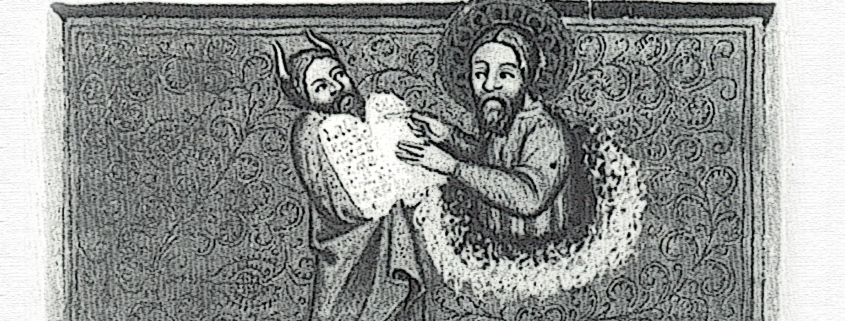Does the New Testament say Jewish people are Satanic?
When antisemites misuse the New Testament to justify their hatred of Jewish people, one of their favorite verses to cite is John 8:44. They claim this passage labels Jewish people as “children of the devil.” The verse reads:
“You are of your father the devil, and your will is to do your father’s desires. He was a murderer from the beginning, and does not stand in the truth, because there is no truth in him. When he lies, he speaks out of his own character, for he is a liar and the father of lies.”
If these words were spoken by a Christian about Jews as a whole, they would certainly be antisemitic. But the problem is that this is a serious misreading of the text. Antisemites take this verse outrageously out of context to fuel their hatred. To understand what is really happening here, we need to do what antisemites refuse to do—read the passage within its first-century Jewish context.
Understanding John 8:44 in Context
In John chapter 8, Jesus is addressing “οἱ Ἰουδαῖοι,” commonly translated as “the Jews.” However, throughout the Gospel of John, this phrase rarely refers to the entire Jewish people. Rather, it almost exclusively designates a specific group of Jewish leaders hostile to Jesus. This distinction is vital for interpretation.
Who are “the Jews” in the Gospel of John?
We can see this clearly in John 1:19–25, where “the Jews” send priests and Levites from Jerusalem to question John the Baptist. These leaders are associated with the Pharisaic establishment, who are later shown as actively seeking to kill Jesus. This pattern continues throughout John’s narrative. For example, in John 7:1, Jesus avoids traveling in Judea because “the Jews” there are plotting to kill him. Even some common Jewish people hesitate to speak openly about Jesus “for fear of the Jews” (John 7:13). Everyone in the scene is Jewish, so “the Jews” is used as a key term to describe a particular subgroup of Jewish people: the Jewish ruling establishment in Jerusalem. For example, in John 18:14, Caiaphas, the Jewish high priest, advises that it is better for one man to die for the people, underscoring the leadership’s involvement in Jesus’s death.
All these examples indicate that John’s use of “the Jews” typically refers to a particular group of Pharisaic and priestly leaders who oppose Jesus, rather than the Jewish people as a whole. When John uses “the Jews,” he often does so with irony and sarcasm, criticizing these leaders for claiming to be disciples of Moses while rejecting Jesus—the very Messiah Moses had foretold (John 5:46). This is not an antisemitic slur but a pointed critique of certain Jewish authorities.
So, when Jesus says in John 8:44, “You are of your father the devil,” he is not condemning all Jews but addressing this specific group of hostile leaders. While Jesus acknowledges they are “offspring of Abraham,” he points out that if God were truly their Father, they would love him, because he came from God (John 8:42–43). Instead, their actions align with the devil, who embodies lies and murder rather than truth and love.
Intra-Jewish Polemics, Not Antisemitism
Jesus’s words are thus about spiritual allegiance, not biological descent. He accuses these leaders of being influenced by the devil, the source of their hatred and opposition. Consequently, John 8:44 should never be read as a blanket condemnation of the Jewish people. Rather, it reflects heated intra-Jewish polemics between Jesus and certain Pharisaic authorities. The strong language illustrates the intensity of their dispute, much like the fierce exchanges found within Jewish texts such as the Babylonian Talmud, where one rabbi calls another “the firstborn of Satan” (Yevamot 16a). These disputes, though strong, are not examples of antisemitism.
John 8:44 is part of a complex, nuanced intra-Jewish dialogue. It is not an attack on the Jewish people, but a forceful rebuke of specific Jewish leaders who opposed Jesus. Using this passage to justify antisemitism is not only inaccurate but also profoundly unjust.
Misuse of Revelation 2:9 and 3:9
Two other New Testament passages that antisemites misuse to promote hatred against Jewish people are Revelation 2:9 and 3:9, where Jesus allegedly tells Jews who don’t follow Jesus that they belong to “the synagogue of Satan.” These verses read:
Revelation 2:9: “I know your tribulation and your poverty (but you are rich) and the slander of those who say that they are Jews and are not, but are a synagogue of Satan.”
Revelation 3:9: “Behold, I will make those of the synagogue of Satan who say that they are Jews and are not, but lie.”
Antisemites take the phrase “synagogue of Satan” completely out of context. Significantly, the text explicitly states that those in the synagogue of Satan are not Jews—they are “those who say that they are Jews and are not.” This indicates that the group being condemned are not Jews but rather Gentiles who falsely claim Jewish identity. Jewish scholar David Frankfurter confirms this interpretation, explaining that “John means ‘synagogue of Satan’ only as a rejection of those pretending to be Jews.”1
This distinction is crucial. The New Testament is Jewish literature written by Jewish followers of Jesus who believed he was the long-awaited Messiah of Israel. Antisemites perversely use this deeply Jewish text to justify hatred of Jews, when the text itself does not promote such hatred.
The New Testament’s Message of Love for Israel
Instead, the New Testament, including John and Revelation, expresses profound love for Israel. For example, John 13:1 states:
“Now before the Feast of the Passover, when Jesus knew that his hour had come to depart out of this world to the Father, having loved his own who were in the world, he loved them to the end.”
This verse poignantly shows Jesus’s deep love for his own people. Similarly, Revelation 21:10–12 describes the holy city of Jerusalem descending from heaven:
“And he carried me away in the Spirit to a great, high mountain, and showed me the holy city Jerusalem coming down out of heaven from God, having the glory of God, its radiance like a most rare jewel, like a jasper, clear as crystal. It had a great, high wall, with twelve gates, and at the gates twelve angels, and on the gates the names of the twelve tribes of the sons of Israel were inscribed.”
This beautiful vision underlines the centrality of Israel and Jerusalem in God’s plan, affirming the enduring love and destiny of the Jewish people.
In summary, misusing New Testament texts like John 8:44 or Revelation 2:9 and 3:9 to promote antisemitism is a grave distortion. A proper reading reveals these passages are intra-Jewish polemics (John 8:44) and condemnations of false claimants (Revelations 2:9 and 3:9), not wholesale attacks on Jewish people. The New Testament offers a message of profound love for Israel—its people, its history, and its future.









